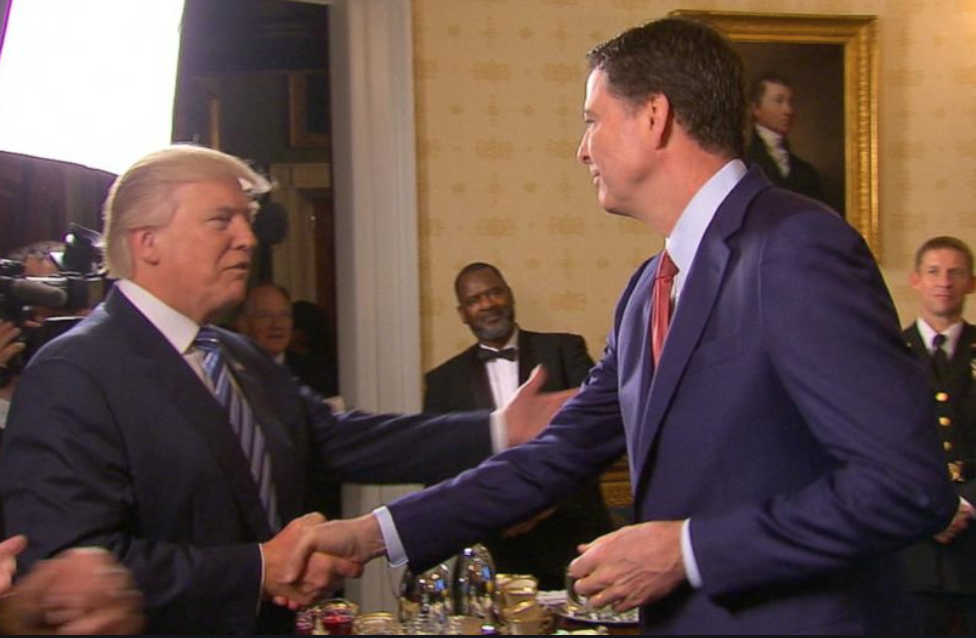Welcome to Byron York’s Daily Memo newsletter.
Was this email forwarded to you? Sign up here to receive the newsletter.
THREE TAKEAWAYS FROM OBSESSION. Please excuse the plug: My new book, Obsession: Inside the Washington Establishment’s Never-Ending War on Trump, is now officially available. It’s the result of nearly four years of covering the effort to remove President Trump from office. It has quite a bit of news in it — more on that in the next day or so — but already three stories stand out:
1) Long before the inauguration, advisers urged Trump to fire Comey. “I advised him to fire Comey,” Rudy Giuliani told me. “Every time we talked about Comey, I said the guy’s gonna turn on you. There’s something wrong with him.” The thinking was not that Trump allies were angry at Comey’s treatment of Hillary Clinton in the email case, although they thought it was erratic and unprofessional. The problem was they worried Comey would continue that erratic behavior into a Trump administration.

Former New Jersey Governor Chris Christie urged Trump to take quick action with Comey, either to win his allegiance or get rid of him. “If he stays, and he’s a loose cannon like that while Obama’s in office, why would we think he’d be any different when President Trump was in office?” Christie said. “I said to him, ‘You have to either develop a trusting relationship with Comey or you need to get rid of him right at the beginning if you don’t trust him. Once you take the oath, if you keep him, he’s yours.”
Subscribe today to the Washington Examiner magazine that will keep you up to date with what’s going on in Washington. SUBSCRIBE NOW: Just $1.00 an issue!
2) The Trump team suspected Mueller had suffered cognitive decline. During the course of the Trump-Russia investigation, the Trump defense team came to believe that special counsel Robert Mueller was weakening and not as mentally sharp as he used to be, and that his condition was affecting the investigation. Meetings with Mueller were extremely rare — most of Trump’s defenders had been in exactly one — and Mueller aides deflected requests to talk to him.
In one key meeting where Mueller was present, in April 2018, Trump defenders were stunned when he could not recall a key Justice Department policy — the policy that a sitting president cannot be indicted, which played an extremely important role in the investigation. “After that, we never met with Mueller and we never spoke with him on the phone,” one Trump defense lawyer told me. Another Trump defender, one who had a high opinion of Mueller, worried about the special counsel’s appearance and asked prosecutors if Mueller was in good health. Giuliani said Mueller was working with “half a deck.”
That led Trump’s defenders to suspect that someone else — one of Mueller’s aggressive prosecutors — was actually running the investigation. “I don’t believe for a moment [Mueller] actually wrote or understood” his report, said another Trump lawyer. At the end of the investigation, Mueller was “AWOL,” Jay Sekulow told me. “That was the great con. He showed up for cameo appearances. He was the Wizard of Oz. He was back behind the big curtain, pulling some strings here and there, but when you pulled the curtain away, he wasn’t even really the one pulling the strings.”
3) Trump’s lawyers believed Mueller broke a key promise. The Trump defense and Mueller’s prosecutors made a deal at the beginning of the special counsel investigation. Instead of claiming executive privilege as he had a right to do, the president would authorize the testimony of high-ranking aides and supply Mueller with the documents he needed for the probe. In return, Mueller would finish the investigation quickly.
In their first meeting, Mueller and top Trump lawyer John Dowd shook hands on the deal. “I don’t let any grass grow under me,” Mueller told Dowd, promising a speedy investigation. In the months that followed, Trump kept his end of the bargain. He handed over more than a million documents and allowed top aides, including White House counsel Don McGahn, to testify.
It was an extraordinary show of good faith. “Bob said on several occasions that he had never seen such cooperation,” Dowd recalled. In the investigation’s first months, the Mueller team failed to establish that collusion — formally known as conspiracy or coordination between Russia and the Trump campaign — ever occurred. Time passed; 2017 turned into 2018. And then Mueller, having failed to find collusion, told the Trump team he needed the president’s testimony on the question of obstruction. A short, tightly focused collusion investigation had turned into an open-ended obstruction investigation. The Trump team was angry and frustrated. “We really relied on Mueller’s word,” Dowd recalled. “And he absolutely busted his word and played all sorts of games from then on. It was stunning to watch.”
That’s it for now. Again, the book is available here. And as I said, there’s more, and it will come out in the next few days.
